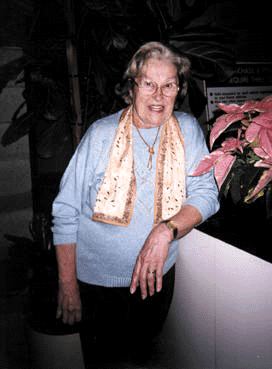Jaye Waggoner, BAA
| 
|
| Ms.Waltraud Geisler |
The day starts bright and early at 5 a.m. for Ms.Waltraud Geisler. An early riser by nature, the first order of business is a little quiet rest; it is a time when she can take in the news or read. At seven it is time for breakfast and then some writing. Recently, Ms. Geisler's daughter-in-law has asked her to document the family's history all the way back to the days when she left her home land, Czechoslovakia. After working on that for a couple of hours it is time to begin her volunteer work. She spends nine to noon on the 'Safety Line' calling members of her community that are shut-in to make sure they are alright. Then there is time for a quick lunch before heading out for the afternoon. Ms. Geisler is a Peer Councilor for other seniors. Right now she has five clients she visits on a rotating basis, or whenever they need her. She wraps up the day returning home around five for dinner, the news, some knitting perhaps, a little reading, listening to music, relaxing and then off to bed at ten.
It is a rigorous and demanding schedule by anyone's standards, never mind the fact that Ms. Geisler is 76 years old. What is her secret to staying so active and participating fully in her life and the lives of others? Well, according to her the answer is in the question. "I am out everyday, seven days a week." She has a routine that she follows and by doing that and through helping others she is fueled to continue doing the same. "If I sat at home with nothing to look forward to I would get depressed," she said. She went on to say, with a smile, just how important it is to "get moving and keep moving" even if it is just a walk around the block.
The pattern is certainly working for her. In the past she has only had to deal with an ulcer, that has since healed and a hip operation, which has somewhat limited what she can do physically. At 76, she is happy to say, she takes no prescription medications. She believes that physicians should put their foot down and try to limit the drugs they prescribe to seniors and in turn seniors should find other ways to feel good. "Doctors should talk to seniors and listen. Everyone relies too heavily on prescription drugs, especially seniors," she said. "This is not to say that drugs are the enemy, obviously in some cases like heart medication they are very necessary. But some," she went on to list, "like sleeping pills, tranquilizers, and those used to treat depression, may not be."
Ms. Geisler takes a multi-vitamin, vitamins E, C, B complex, calcium and magnesium, and drinks a lot of water, as she does not always feel like shopping and cooking. She also recognizes the value of exercise. She believes you can get exercise in a variety of ways. It does not have to be structured classes. "The only exercise I get is walking, and I feel good," she said. Not only does she bus and walk everywhere, she encourages other seniors, even those with limited mobility, to get out.
Ms. Geisler believes that like herself, if other seniors stay active physically, keep their minds busy, eat reasonably healthy and find someone who will listen and understand them, they could significantly improve their overall long-term health. "They may not find themselves needing so many prescription drugs down the road," she said. The recipe for good health, she says, could be as simple as talking, listening and really living, not simply existing.

